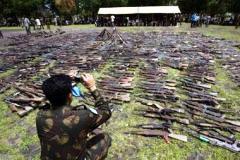Armed youth voluntarily disarm in Sudan’s Jonglei
Aug 22, 2006 (AKOBO) — Young men eyed the 1,300 guns laid out in a field in the southern Sudanese town of Akobo. The rifles would once have been worth a fortune to these members of the Lou Nuer, who typically used weapons to defend themselves or to raid neighbouring villages.
 Arms were once considered integral to life in this region. But in July, more than 1,000 men and boys in Akobo County relinquished their weapons to local authorities, asking nothing in return.
Arms were once considered integral to life in this region. But in July, more than 1,000 men and boys in Akobo County relinquished their weapons to local authorities, asking nothing in return.
Turning in their guns was a bold move for those who live in an area with little infrastructure and a shaky police force. Guns are still rife in neighbouring villages, some of which have long-running rivalries with the Lou in Akobo.
At a celebration to mark the disarmament of Akobo County, observers paid tribute to those who had voluntarily disarmed, despite the dangers.
“It takes more bravery to put down a gun than to use one,” David Gressly, the United Nations humanitarian coordinator for south Sudan, said.
The disarmament of Akobo is part of an attempt to combat lawlessness, which has been rampant in southern Sudan, despite the signing of a January 2005 Comprehensive Peace Agreement (CPA) that ended 21 years of civil war between north and south.
As part of the peace deal, the southern Sudan People’s Liberation Army (SPLA) was to disarm civilians and local militias that had acquired arms either to protect themselves during the war or to participate in the conflict as a proxy force. The proliferation of weapons exacerbated traditional local conflicts over scarce natural resources, escalating attacks on neighbouring villages, cattle raids and burning of homes.
The local militias have remained a threat to peace in southern Sudan, which was granted an autonomous government as part of the CPA and is faced with the challenge of rebuilding the war-torn region.
Critically though, some militias in the region did not support the SPLA in the war that pitted many southerners against Sudan’s northern Islamic government. These resisted handing over their weapons to their former foes.
In January, a forced disarmament programme by the new SPLA authority sparked further violence in Jonglei state as many in the region felt their guns were being taken by force. Disarmed villagers maintained they had no way of protecting themselves from nearby villagers who still possessed weapons. Armed tribesmen fought SPLA soldiers, causing hundreds of deaths and exacerbating tensions between the SPLA and local southern populations.
David Lochhead, working for the United Nations on disarmament, demobilisation and reintegration, told IRIN that in the aftermath of the violence caused by forced disarmament, it became clear to local leaders disarmament might be more successful if done voluntarily rather than forcibly by the SPLA. He credited Akobo with taking a grass-roots approach to the disarmament process.
“This is driven by the country commissioner who organised the disarmament. It was run through committees comprised of civil authorities, police, SPLA, women’s organisations, youth organisations, community-based organisations, high-end administrators. It was quite a comprehensive approach,” Lochhead said.
He estimated that the programme in Akobo would likely set a precedent for villages to disarm themselves voluntarily.
Akobo residents, however, say they are still concerned about the threat of attack from the neighbouring Murle. The Lou and Murle are long-standing rivals and the Lou had been attacked several times by the Murle as late as April this year. The Lou claim 150 members have been killed in Murle raids since December 2005.
“The people of Akobo have given up their guns, but they have enemies,” said John Koang of the Akobo Youth Association, speaking at a formal ceremony with UN officials and local authorities. “Who will protect us?” Koang asked.
Authorities say the police force must be built up so it can protect civilians. Police officers lack training and uniforms, and often look like armed civilians. But supporters of voluntary disarmament stress that those who relinquish their weapons will be provided with more benefits than those who keep them.
“This is a meaningful day for Akobo County because we have carried out peaceful disarmament without casualties. The community had been killing themselves with arms. We haven’t been good with our neighbours,” said Commissioner Doyak Shoal, who estimates that about 200 guns have still not been turned over to authorities.
Shoal observed that the war-torn region had been cut off from humanitarian aid due to the proliferation of weapons. Inter-ethnic tensions often turned violent, forcing aid workers to flee.
“Akobo has been a place of problems for humanitarian organisations. They are not willing to come because of these problems. This county has not benefited from humanitarian operations. This day we will be declaring to non-governmental organisations that Akobo is a peaceful county,” Shoal said.
The commissioner stressed the need for health services and schools, which will be critical now that young men in the region can no longer make a living conducting raids on neighbouring villages.
Despite the risks associated with disarmament, most young men told IRIN they were not concerned about giving up their weapons because of a strong belief that something better lies in store for them.
“It is not hard to do this,” said Tut Turik. “It’s something we must do because peace has come.”
(IRIN)
See also: Fragile disarmament in the south: www.irinnews.org/S_report.asp?ReportID=54959&SelectRegion=East_Africa
